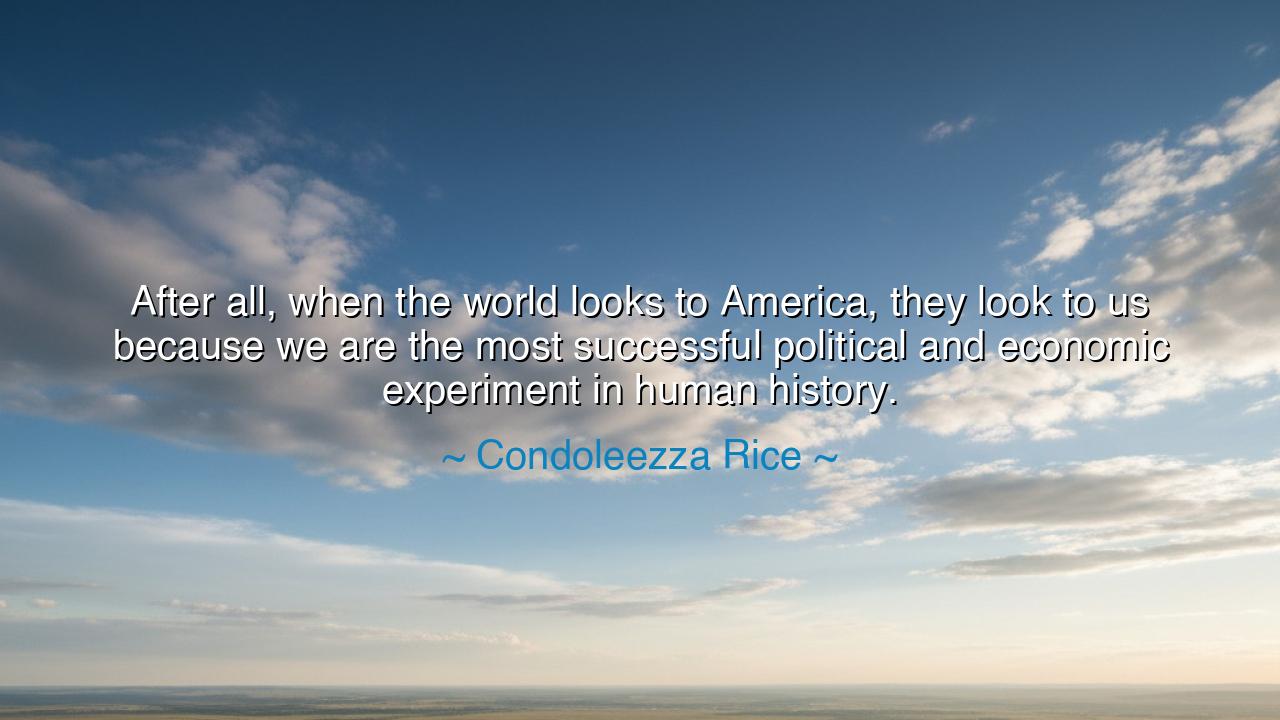
After all, when the world looks to America, they look to us
After all, when the world looks to America, they look to us because we are the most successful political and economic experiment in human history.






“After all, when the world looks to America, they look to us because we are the most successful political and economic experiment in human history.” — Condoleezza Rice
Listen, O seekers of liberty and guardians of democracy, to the voice of Condoleezza Rice, daughter of the American South, scholar, diplomat, and servant of her nation. In this profound declaration, she speaks of America not as a mere country, but as an experiment — a daring wager made by humanity upon the possibilities of freedom. She reminds us that the world’s gaze turns toward the United States not only because of its wealth or its power, but because it embodies an idea: that people of every race, creed, and origin might live together under the rule of liberty, guided not by kings, but by laws, and lifted not by bloodline, but by opportunity.
The origin of this quote lies in Rice’s own journey, one that mirrors the American struggle itself — from bondage to freedom, from exclusion to participation. Born in Birmingham, Alabama, during the age of segregation, she knew the heavy weight of injustice, and yet rose through it to become the nation’s Secretary of State, one of the highest offices in the land. For her, America’s “experiment” was not theory but experience — a living, imperfect, yet ongoing project of self-correction. In her words, we hear both pride and challenge: pride in the endurance of democratic ideals, and challenge to each generation to preserve and perfect them.
When Rice calls America the “most successful political and economic experiment,” she invokes the vision of the Founders — men who, at great risk, sought to create a republic where power flowed not from tyranny, but from consent; where wealth could be earned by merit, not inherited through privilege. It was an idea so bold, so fragile, that even its creators doubted whether it could endure. “A republic,” Benjamin Franklin warned, “if you can keep it.” Yet across centuries, through war and turmoil, expansion and reform, the experiment endured. It survived because its essence was not perfection, but the constant pursuit of improvement — a willingness to confront failure and rise anew.
Think upon the Civil Rights Movement, that sacred chapter in America’s moral history. The dreamers of that age — Martin Luther King Jr., Rosa Parks, John Lewis — demanded that the nation live up to its own experiment, that its promises of equality be made real for all. They tested the strength of the system, and the system, though strained, did not break. It evolved. Through their courage, the experiment proved itself again: capable of renewal, capable of justice. And it is this capacity for reinvention — to fall, to rise, and to strive once more — that makes America’s story not just its own, but the world’s inheritance.
For when the world looks to America, as Rice says, it does not see a flawless nation. It sees a living testament to possibility. Refugees fleeing tyranny, reformers fighting corruption, and dreamers seeking freedom all look westward not because America is perfect, but because it dares to believe that perfection can be approached through effort and sacrifice. The idea of America — of liberty tied to law, of individual ambition balanced by collective good — is a fire that has ignited revolutions and inspired constitutions across continents. Even its contradictions — freedom and inequality, justice and prejudice — have served as lessons to humanity about the struggle between ideals and reality.
But Rice’s words also carry a warning. For every experiment can fail if its purpose is forgotten. Democracy, she teaches, is not a gift handed down, but a trust passed on. Each generation must prove itself worthy of the experiment by engaging in it — by voting, by questioning, by learning, by defending truth even when it is inconvenient. The strength of America lies not in its monuments or markets, but in its citizens — in their belief that their individual efforts shape the collective destiny. The moment the people cease to care for the experiment, it ceases to be.
So let this be your lesson, O inheritor of liberty: do not take the experiment for granted. Tend it as one tends a flame — feed it with courage, protect it with wisdom, and share its light with others. Remember that the greatness of a nation is measured not by its power, but by its purpose; not by its riches, but by its resolve to uphold justice and dignity for all. As Condoleezza Rice reminds us, when the world looks to America, it looks to a promise — a fragile yet enduring covenant between freedom and responsibility. And so long as we honor that covenant, this grand experiment of democracy shall not only survive, but inspire generations yet unborn to believe that humanity can, indeed, govern itself with hope, with fairness, and with heart.






AAdministratorAdministrator
Welcome, honored guests. Please leave a comment, we will respond soon